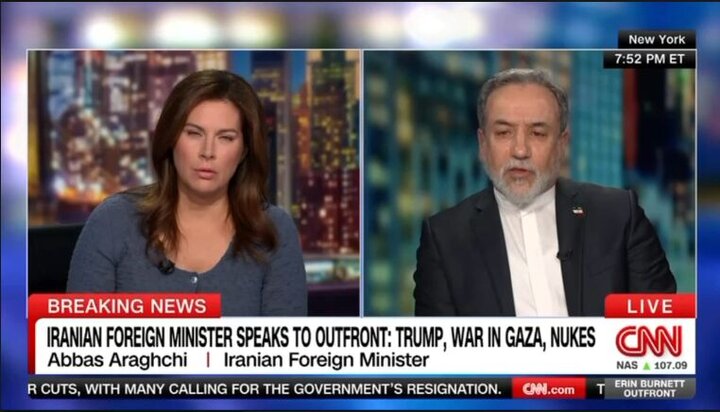Diplomatic solution only way to resolve Iran’s nuclear issue

TEHRAN, Sep. 30 (MNA) – Iranian Foreign Minister Abbas Araghchi says Iran has always been prepared for talks to reach a diplomatic solution to its nuclear issue with the West.
He stressed that military action and the re-imposition of UN sanctions through the snapback mechanism will only complicate the situation.
The Iranian foreign minister made the remarks while speaking with CNN’s Erin Burnett on Monday evening (ET). Iran's top diplomat Araghchi visited New York for the 80th session of the United Nations General Assembly.
The same day, US President Donald Trump repeated his previous statements about Iran’s nuclear program during a joint press conference with Israeli Prime Minister Benjamin Netanyahu at the White House.
“We obliterated Iran’s nuclear enrichment capacity to make it impossible for them to have a nuclear weapon, which they would have had probably in about two months from then,” Trump said, referring to US and Israeli strikes on three Iranian nuclear facilities during the 12-day war Israel launched against Iran on June 13 this year.
Commenting on Trump’s remarks, Araghchi said the reality is that Iran has never sought to possess nuclear weapons, and it proved this when it signed the Joint Comprehensive Plan of Action (JCPOA) with the P5+1 countries, including the United States, in 2015. The P5+1 group is made up of Germany and the five permanent members of the UN Security Council, which are the US, France, Britain, Russia, and China.
The Iranian foreign minister further said that Iran implemented the JCPOA with good faith and fulfilled all of its commitments. The US withdrew from the JCPOA in 2018 without any legitimate justification, since numerous reports by the International Atomic Energy Agency had confirmed that Iran was fully abiding by its obligations, he added.
Iran has proved that it is not seeking nuclear weapons and accepted Trump’s invitation for nuclear talks in May and June 2025, said Araghchi. Five rounds of talks were held, but Israel attacked Iran two days ahead of the planned sixth round of the negotiations, and the US accompanied Israel in that attack, he added.
Iran has had two bitter and unpleasant experiences with the United States. Once, an agreement was reached but the US withdrew from it, and then again this year, Iran entered negotiations only to come under attack, the top diplomat noted.
He noted that the US struck the Iranian nuclear sites and caused severe damage to them, but the military action failed to resolve the standoff, since Iran possesses indigenous nuclear technology and has not relied on imports from abroad.
Iran has developed this technology independently and it remains within its reach, he said. If there are concerns about Iran’s nuclear program, the solution must be diplomatic, and Iran has always been ready for dialogue and a negotiated settlement, Araghchi explained.
The top diplomat also said that he arrived in New York last week with fair, balanced, and constructive proposals for a diplomatic resolution to the standoff. However, those proposals were rejected by the US and the E3 — Britain, France, and Germany — who instead resorted to the snapback mechanism that reinstated UN sanctions against Iran, he added.
They chose military action, but it did not resolve the issue. Now they are turning to the snapback mechanism, which will not resolve the issue either. On the contrary, it will only complicate the situation and make it more difficult to achieve a diplomatic solution, the Iranian foreign minister said.
On Trump’s 20-point plan for a ceasefire in Gaza, Araghchi said that Iran seeks an end to the genocide in Gaza and that all governments are obliged to cooperate toward that goal.
He also noted that more than a hundred plans have been proposed over the past eight years to resolve the Israeli-Palestinian conflict, but the only plan that can endure is one that recognizes the Palestinians’ right to determine their own fate. He added that he has reviewed Trump’s plan and is waiting to see how Hamas will respond.





